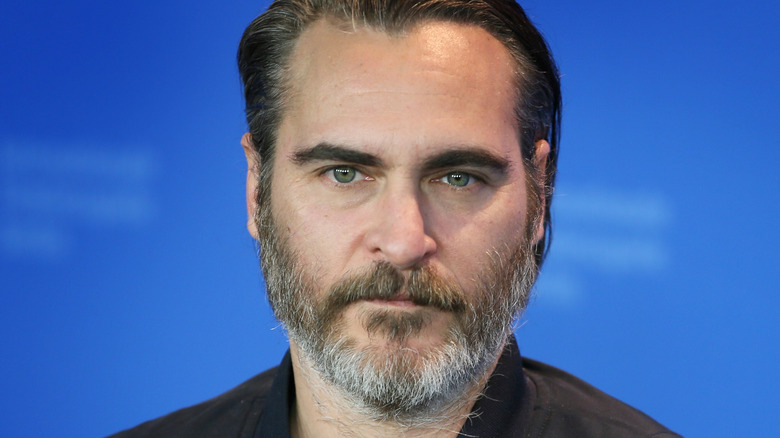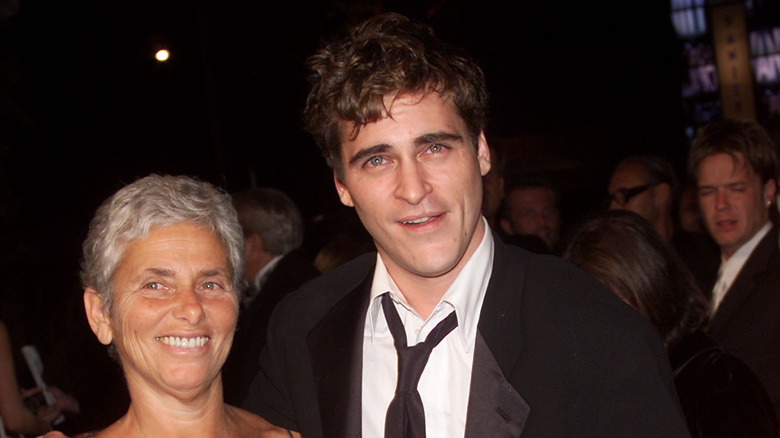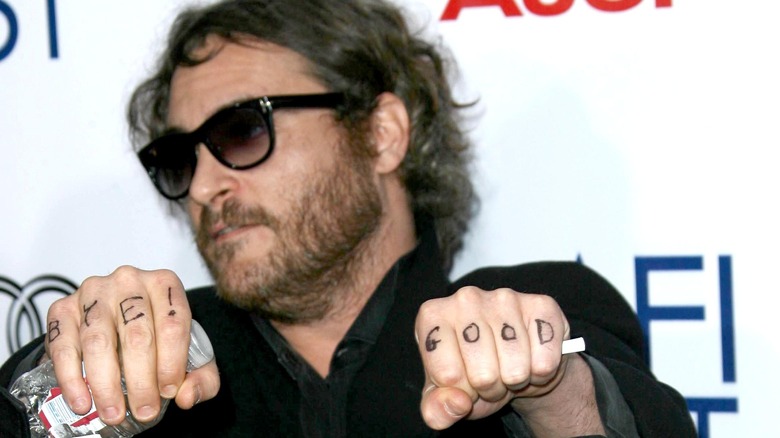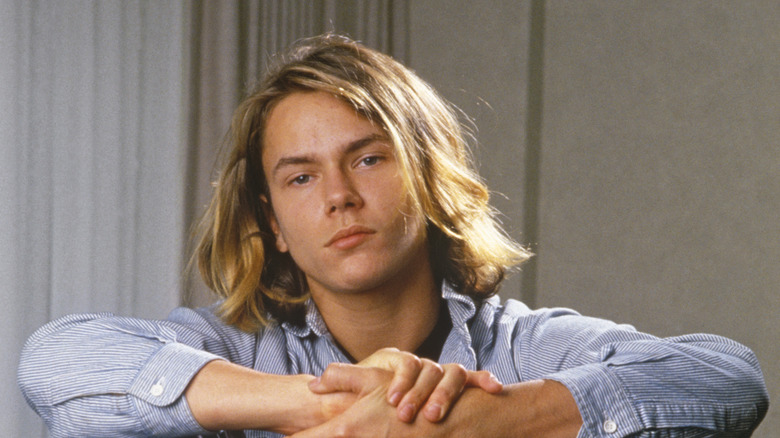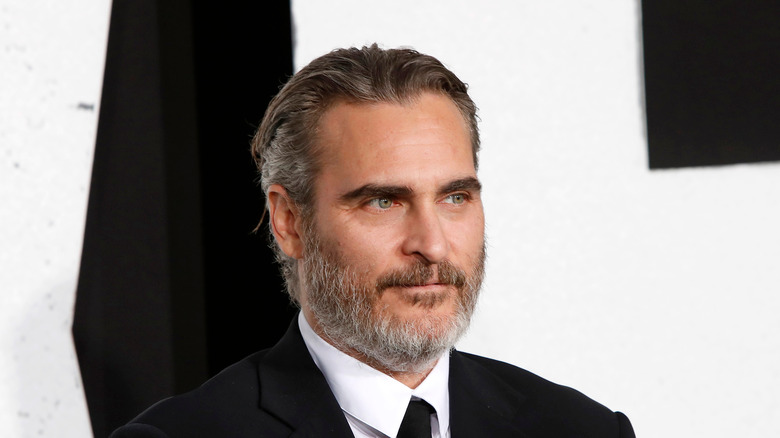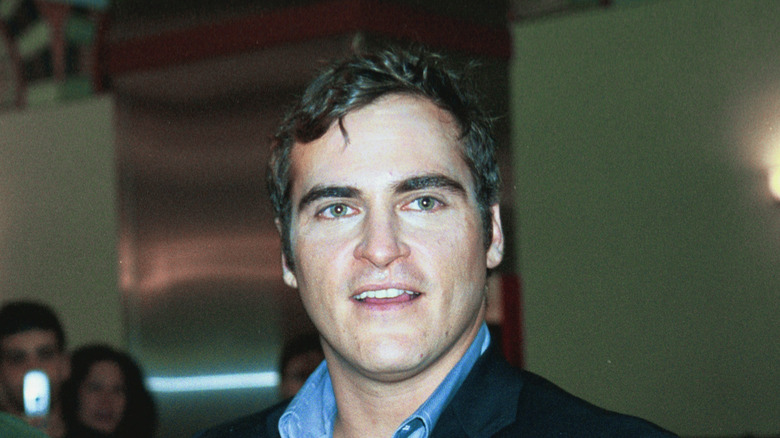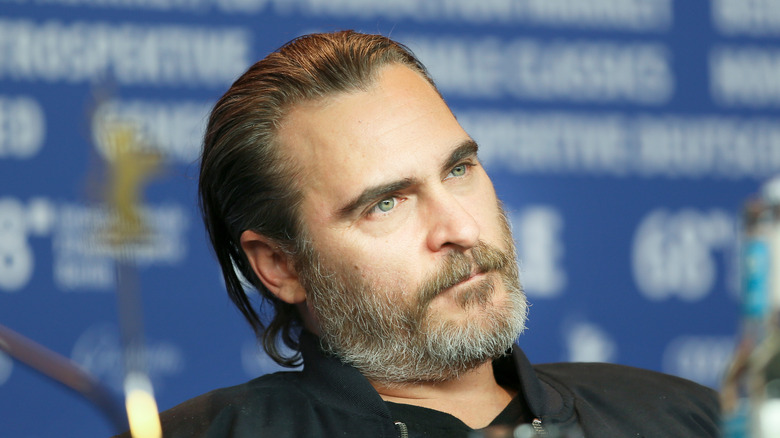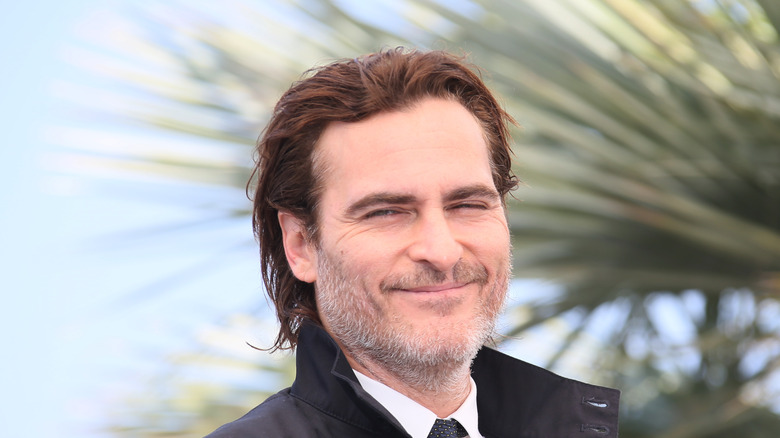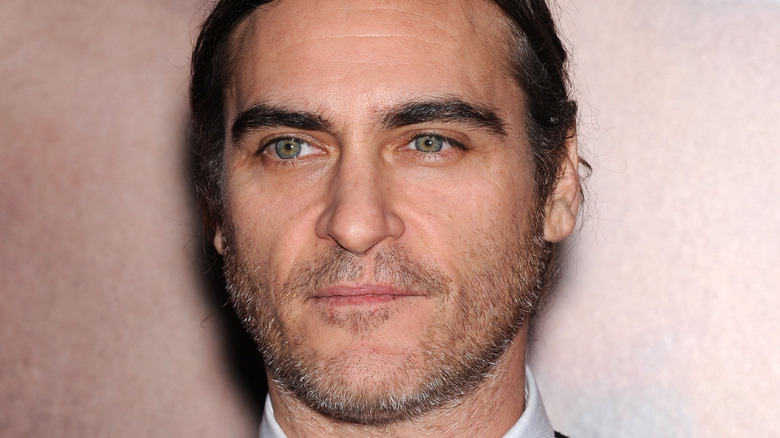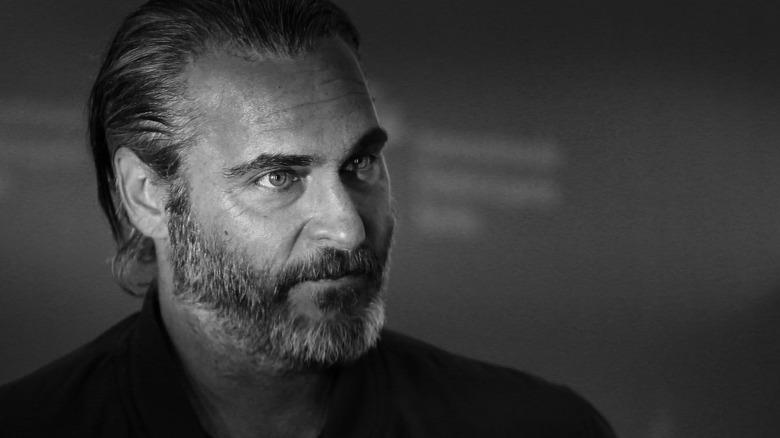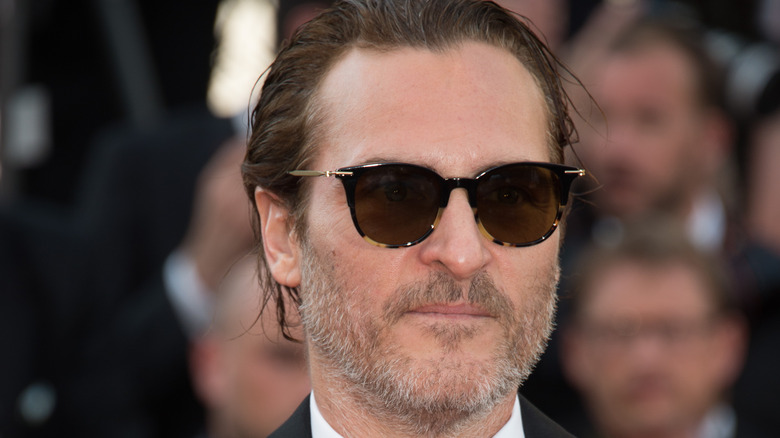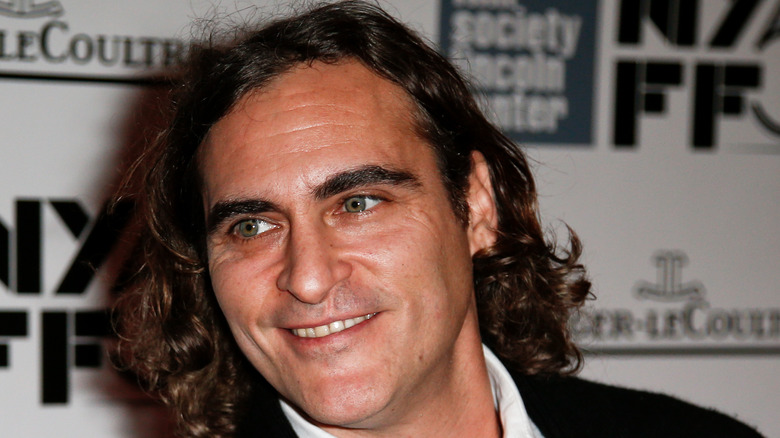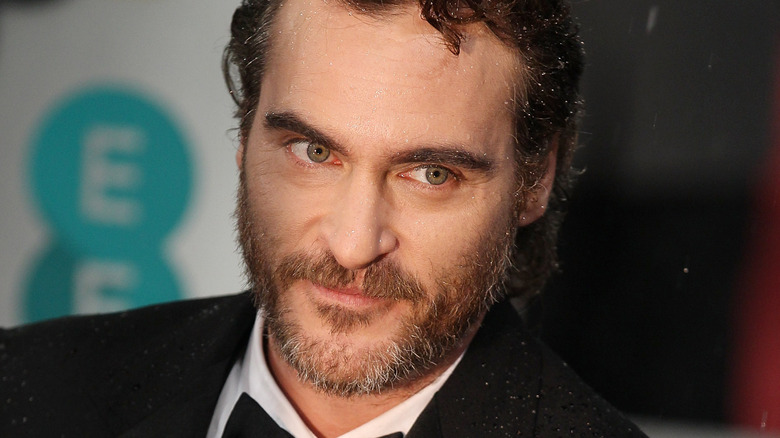The Tragic Real-Life Story Of Joaquin Phoenix
Few actors have played as many intriguing, eccentric roles as Joaquin Phoenix — from Johnny Cash in "Walk the Line" to the Joker in Todd Phillips' eponymous movie, he covers pretty much every kind of character. With several awards – including an Oscar — under his belt, one might wonder where Phoenix gets his inspiration. Although he is famous for his privacy, his life story speaks volumes.
As per Watch Mojo, Phoenix was born to parents John Lee and Arlyn, who traveled throughout South America in an attempt to spread the teachings of a highly controversial cult named the Children of God. As LA Weekly reports, this cult encouraged children to develop their sexuality very early on (among other horrifying aspects). During this time, young Phoenix and his four siblings would also beg in the streets for cash. Then, just as he was getting noticed for his talent in Los Angeles, Phoenix watched his brother River die. These are just a few of the intense ordeals Phoenix went through at a young age. Today, he is arguably using these experiences as fuel for his exceptional roles — but this doesn't make his life any less sad. Here is the tragic real-life story of Joaquin Phoenix.
He grew up in a cult that promoted sexual abuse
Joaquin Phoenix's parents, John Lee and Arlyn, joined the Children of God cult in the 1970s, as per Esquire. The cult was led by a preacher named David Berg –- but who, as Vanity Fair reports, would call himself "Moses," perhaps indicating his character. Cults rarely admit they're cults, but there was a much deeper, much darker hidden reality to the Children of God. According to Gavin Edwards' biography "Last Night at the Viper Room: River Phoenix and the Hollywood He Left Behind," they encouraged incest, adultery, and very early sexual experiences in children, inviting them to "play" with each other after their bedtime prayers.
Phoenix never commented on exactly what he experienced as a very young child during his time, but his older brother River did. Apparently, River had his first sexual experience when he was only 4 years old: "But I've blocked it out. I was completely celibate from ten to fourteen." Joaquin Phoenix was only 3 when the family decided to leave the cult and head for the States once more (on a cargo ship going from Venezuela to Miami), but this doesn't mean that he wasn't subjected to trauma beforehand.
If you or anyone you know has been a victim of sexual assault, help is available. Visit the Rape, Abuse & Incest National Network website or contact RAINN's National Helpline at 1-800-656-HOPE (4673).
He constantly feels vulnerable on set
In an interview with Esquire, director Spike Jonze explained that Joaquin Phoenix is always fearful and lacks confidence on set: "He doesn't know where he's going or how to get there. He doesn't want to know what the outcome of a moment is until he shoots it." This means that, although Phoenix is an experienced actor, he always finds it very hard to shoot a scene. Every character is a new journey for him, so he starts from scratch every single time. This also means that Phoenix needs quite a lot of guidance from directors.
Back in 2012, he confessed to the Independent that he rarely feels in control and that he has a lot of self-doubts on set: "I think the trouble is that I'm not very good and I need a lot of help; I need the entire set to be working to help me. The only way I can work is to be very close to the director and the acting. At least people like Paul make you feel that is a priority." Here, he is referencing Paul Thomas Anderson, who directed the 2012 movie "The Master."
He watched his brother die
River was the eldest of five Phoenix children (via Vanity Fair). He was also the star in the family –- by 1993, 23-year-old River had achieved fame through films like "Stand by Me" and "My Own Private Idaho," as per The Washington Post. But on October 31, 1993, a dark and sudden end would come to River's life. As per Gavin Edwards' biography "Last Night at the Viper Room," River was partying at The Viper Room in Los Angeles when someone handed him a drink: "Hey, Riv, drink this — it'll make you feel fabulous." It was a speedball (far over the lethal dose, according to the coroner's report), and River immediately felt something was very wrong. He quickly swallowed a Valium, hoping to curb the speedball's horrendous effects, but it only made things worse.
As he collapsed, his 19-year-old brother Joaquin watched. Joaquin was also the one to make the harrowing 911 call – but within an hour of collapsing, River was pronounced dead. This experience seriously affected Joaquin, who took a two-and-a-half year break from acting as a consequence (via the Independent).
If you or anyone you know is struggling with addiction issues, help is available. Visit the Substance Abuse and Mental Health Services Administration website or contact SAMHSA's National Helpline at 1-800-662-HELP (4357).
Joaquin Phoenix lived in extreme poverty
The Phoenix family (which was going by the name Bottom at the time, as Vanity Fair reports) led an itinerant life while they were part of the Children of God cult. They moved between the Southwestern states and Latin America — John and Arlyn had been titled "the archbishops" of Venezuela and Trinidad and tasked with spreading the cult's teachings in those countries. But there was no remuneration for this job, so the family lived in extreme poverty. River Phoenix described the family's Venezuela home as a "rat-infested shack with no toilet" (via Watch Mojo).
Then, the Bottoms left the cult and moved to California, changing their last name to Phoenix — a symbol of their rebirth. However, the family still had no money and no means to properly care for the five children. In an interview with Esquire, Joaquin Phoenix described how around this time, the whole family lived in a one-bedroom apartment with a strict "no children" policy. They relied on the kindness of their manager, and they would have to hide whenever the owner would visit: "I remember hiding behind the laundry machine when the owner came over... We could be there for hours." It was around this time that Phoenix's parents would send their children to auditions, hoping for a big break: "We'd get into a station wagon that would break down at least twice a f****g week, and we'd drive, all five of the kids, to the different studios for auditions."
He hates the mourning-brother image
In 2005, Joaquin Phoenix played music legend Johnny Cash in James Mangold's movie "Walk the Line." While filming, Phoenix banged his head while method acting — as Newsweek reports, he wanted to get inside the character's head as the scene involved Cash going through a tough withdrawal. However, tabloids made this moment into Phoenix suffering a breakdown. The reason they gave was an uncanny similarity between the death of Cash's older brother and Phoenix's.
Phoenix was hurt and insulted by the image the media painted of him through the years (an image that culminated with "Walk the Line"): "You know, the press has kind of imposed upon me the title of Mourning Brother, and because I haven't been vocal about it, the assumption is that I'm holding onto it... I don't need to pull from my experience for a character, and I've never understood why actors would, except for lack of ability, imagination, or research. I had all three things, so this is a little frustrating to me, because it denies my work and the research that I did. It bothers me that this happens, because it's slightly exploitative. Suggesting that I would use this personal part of my life for a f*****g movie... it kind of makes me sick."
He lost his father to cancer (and got upset at a reporter for not knowing)
Joaquin Phoenix is notoriously private during interviews — as IndieWire reports, he was traumatized by reporters as a child — and often chooses to avoid them. This is perhaps why, in the 2019 interview he gave to Vanity Fair, Phoenix was asked where his father lived at the time. When he replied "in heaven," the reporter assumed it would be a beautiful, exotic place like Costa Rica. It took an awkward exchange of questions and bitter remarks to get to the dark reality of it: Phoenix's father had died of cancer in 2015.
When the reporter asked, "He's alive, right?" before the revelation, Phoenix only followed with more sarcasm: "Oh is he? Oh cool, great. Let's talk to him." It was only then that the reporter understood his mistake. Phoenix's desire for absolute privacy when it comes to his family sometimes proves to create a vicious circle: He is a famous person who attracts interviews with reporters who don't have a lot of information about him, thus risking situations just like the one concerning his father's death.
He felt lost and succumbed to alcohol abuse
"Walk the Line" portrays Johnny Cash as a great musician struggling with substance abuse. But this is not just the director's take on the musician's life. As Reuters reports, Cash's son, John Carter Cash, confirmed his father's lifelong struggle with addiction (and discussed his parents' tumultuous, drug-fuelled relationship). After wrapping up filming in 2005, Joaquin Phoenix checked himself into a rehab clinic (via People) — he had developed a serious alcohol addiction, much like the character he'd portrayed.
At the time, the press assumed Phoenix had developed the self-destructive habit simply because he had spent a great deal of time playing an addict. But he later confessed to Esquire: "I'd just come off this run of work and — God, it's such a stupid f*****g actor cliché, I'm so f*****g embarrassed but — I was like, 'OK now, what do I want?'" Phoenix developed the nasty drinking habit as he felt lost after wrapping up a career-defining role.
If you or anyone you know is struggling with addiction issues, help is available. Visit the Substance Abuse and Mental Health Services Administration website or contact SAMHSA's National Helpline at 1-800-662-HELP (4357).
Joaquin Phoenix was once homeless (and a beggar)
Throughout Joaquin Phoenix's childhood, there were many times when he and his family had no income whatsoever. During the years that the family was living in Latin America, Phoenix and his older brothers would often beg in the streets for petty cash (via LA Weekly). But if the Phoenixes had a "rat-infested shack" in Venezuela, when they came to Los Angeles, they didn't even have that. There were seven household members who weren't earning any money, in 1970s Los Angeles, a bustling city with a booming economy and high rent.
There were thus several times when Phoenix and his family slept in their car, as Phoenix himself recalled in a Details magazine interview (via People): "Even when we had no money, we still had a car to sleep in and a friend's driveway we could park in and a dad who said, 'I'm going to take care of you.'" During this time, the Phoenix children started busking in the streets for cash. As LA Weekly reports, River Phoenix was discovered by an agent while busking and started earning roles in commercials. The younger siblings followed, and the rest is history.
He has a very difficult acting process
Perhaps one of the things Joaquin Phoenix is most famous for is his method acting — as SCMP reports, this entails entering the character's mind and not leaving it until filming is wrapped. Sometimes, he goes to great lengths to stay genuine, including starving himself and having his jaw wired shut. His (arguably extreme) method acting also means that Phoenix often abandons his personal life and, as strange as it might sound, his own personality, for months on end. Phoenix commented in The Guardian: "I abandon my life when I work. I don't wear the clothes or listen to the music that defines who I am. I don't communicate with friends or family. It sounds intense, but it's the process of getting there that is really hard."
With moments such as checking into rehab right after wrapping up filming for "Walk the Line," it can be argued that abandoning his life and embracing another one can have a pretty destructive effect on the actor. Furthermore, it's his personal relationships that can suffer as a result of his absence or odd behavior — his 2009 David Letterman interview speaks volumes.
Joaquin Phoenix's method acting might reveal a dark truth
Apart from revealing just how dedicated he is to his career, Joaquin Phoenix's method acting might also reveal a darker aspect of his personality. According to a film producer who spoke to The Sun, Phoenix is quite insecure as a person — he doesn't choose strange, disturbed, or eccentric characters because he is similar to them. He does so because he wants the chance to embody someone else. The producer commented: "He's better at being a character than being himself. He really thinks he's boring." It's a pretty sad take on the actor's life, and perhaps an even sadder one would be that he is uncomfortable with his own life, to the extent that he prefers to fully embrace different lives through the characters he portrays.
However, there are diverging views on the matter. Another Hollywood producer said that, "The reason he's good at playing traumatized is that he was traumatized. He grew up in a cult. His brother died in front of him. None of that presupposes someone who's going to turn out normal." Whether Phoenix feels uncomfortable with himself because of his past traumas or because he believes he is boring might never be revealed — perhaps it's no more than the existential angst we all feel at one point or another in our lives. But there seems to be a dark and arguably tragic reason behind Phoenix's famous method acting.
He can't watch his own movies
Joaquin Phoenix won an Oscar and two Golden Globes for the roles of Johnny Cash in "Walk the Line" and the Joker in the film of the same name. He has several other nominations and awards praising his acting. Still, he claims he can't watch a movie if he acted in it. In 2015, he confessed to Joe that he had only watched two of his many movies, and that it wasn't necessarily his choice: "Paul Thomas Anderson [the director] got me to watch 'The Master' and I saw 'Her'. Those are the only two I've seen."
However, Phoenix isn't proud of his choice. It's more that he can't overcome a hurdle rather than a principle: "I thought I might be mature enough to watch and learn. To think: These are the mistakes that were made. But it's still something I struggle with." The reason? He is highly self-critical: "I can be really affected by things like, 'Do I look good?' 'Do I look bad?' I want it to be what I'm feeling as opposed to something outside the experience" (via The New York Times).
He had a near-death experience
As per CBS, in January 2006, Joaquin Phoenix was in a violent car crash. His brakes stopped working and his car overturned on a canyon road, crashing into another vehicle. He later confessed to author Bret Easton Ellis (during an interview for The New York Times Style Magazine) that he had been overindulging in alcohol and partying constantly following his Golden Globe award for "Walk the Line": "I wasn't engaging with the world or myself in the way I wanted to. I was being an idiot, running around, drinking, trying to screw people, going to stupid clubs." This behavior culminated in the car crash... and in what he did right afterward.
Phoenix was getting ready to light a cigarette when director Werner Herzog saw what he was about to do and stopped him just in time to save his life. Herzog said he recognized the actor even though "he was upside down in this car, squished between airbags that had deployed and wildly trying to light a cigarette" (via The New York Times Magazine). Phoenix himself remembers the event: "A German voice said, 'Just relax'." A few days after his near-death experience, Phoenix checked himself into a rehab clinic.
If you or anyone you know is struggling with addiction issues, help is available. Visit the Substance Abuse and Mental Health Services Administration website or contact SAMHSA's National Helpline at 1-800-662-HELP (4357).
